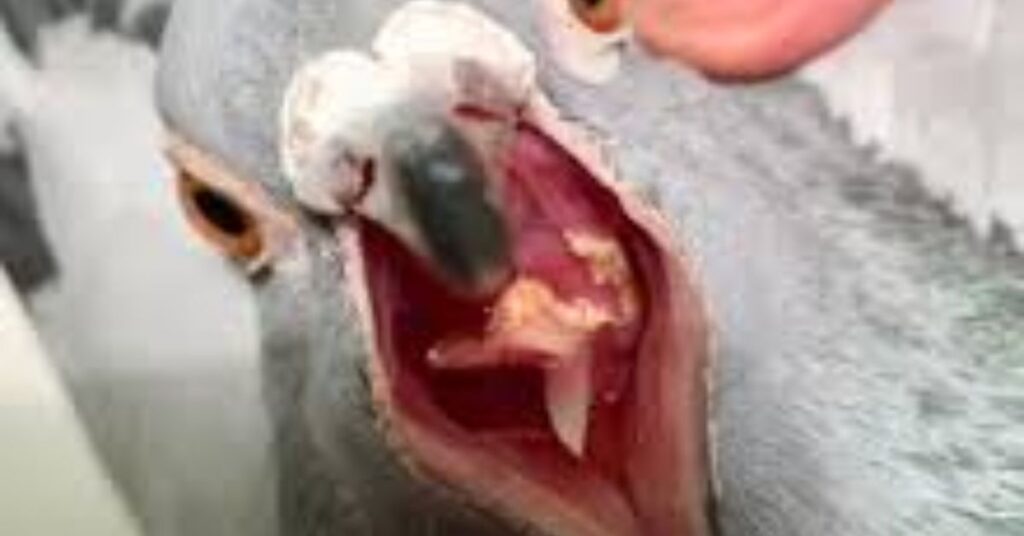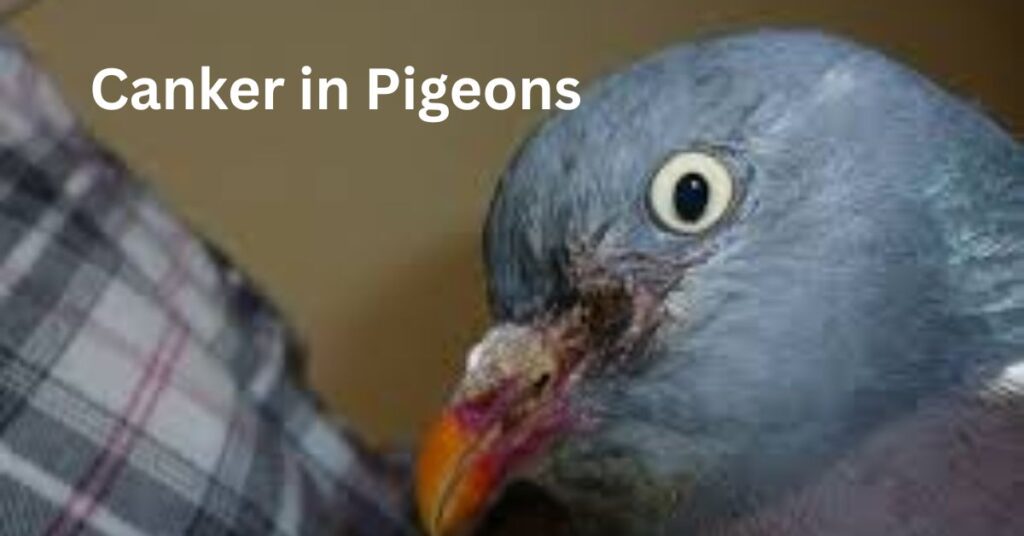Canker in Pigeons is a serious yet treatable disease caused by a microscopic parasite known as Trichomonas gallinae. This single-celled organism lives in the upper digestive tract of birds, where it causes a condition known as trichomoniasis, or more commonly, pigeon canker.
While the disease is quite common among pigeons, especially racing or show birds, it can be effectively managed with prompt care. In this article, we’ll take a deep dive into the signs of canker in pigeons, how it spreads, how to treat it both medically and naturally, and how to prevent it from affecting your flock.
🔍 Signs of Canker in Pigeons
Recognizing the symptoms of canker in pigeons early is essential for effective treatment. Although not all symptoms appear simultaneously, some of the most commonly observed signs include:
- Yellow or white plaques inside the mouth or throat
- Difficulty breathing and frequent attempts to swallow
- Weight loss due to reduced feeding
- Lethargy and reduced activity
- Diarrhea or digestive upset, sometimes with bloody stool
- Excessive thirst and the presence of wet droppings
- Vomiting, often by shaking the head
Here’s an image reference of canker in pigeons to help you identify the condition visually.

🧬 Is Pigeon Canker Contagious?
Absolutely. Pigeon canker is highly contagious and can spread through:
- Food or water contaminated with saliva from an infected bird
- Direct contact, especially when parents feed squabs (baby pigeons)
- Drinking water, which can easily transport the parasite
- Feeding dishes or sharp-edged food pots that irritate the bird’s mouth
While canker in pigeons is contagious among birds, it does not spread to humans or other pets. That said, isolation and hand hygiene are essential for controlling outbreaks.
🏠 Canker in Pigeons Treatment at Home
Many pigeon keepers prefer natural remedies for canker, especially when symptoms are mild. Here’s a simple at-home treatment plan:
- Apple Cider Vinegar (ACV): Mix 1 tablespoon in 1 liter of water. This helps create an acidic environment unsuitable for the parasite.
- Garlic extract: Known for its antimicrobial properties, garlic strengthens immune defenses. Add crushed cloves to water.
- Aloe vera gel: Apply topically on small sores around the mouth.
- Hygiene and loft cleaning: Disinfect regularly with pigeon-safe cleaners.
However, if symptoms worsen or persist beyond 2–3 days, switch to veterinary-grade medicines.
💊 Treatment for Canker in Pigeons
Medical treatment for canker is typically very effective. Here are two common treatment methods:
Treatment One (Secnidazole)
- Mix 1 ml of secnidazole syrup in 1 liter of water
- Feed 10 ml of this solution twice a day for 5–7 days
- Add 1 riboflavin tablet per day (break into smaller parts for baby pigeons)
Treatment Two (Metronidazole)
- Mix 2 ml of metronidazole syrup in 1 liter of water
- Feed twice daily for 5–7 days before food
Continue either treatment for 5 full days, even if symptoms subside by day 3. This ensures the parasite is entirely eradicated.
Here’s a helpful reference on the best treatment for canker in pigeons.
🌧️ What Is Wet Canker in Pigeons?
Wet canker in pigeons is a severe form of the disease where ulcerative lesions extend from the throat into the crop and stomach. It’s extremely painful and can block food passage entirely.
Common signs include:
- Swelling of the throat and crop
- Open sores leaking pus
- Severe difficulty swallowing or breathing
This form often requires hospitalization and direct oral administration of Rondidazole or Carnidazole.
📸 Pictures of Canker in Pigeons
Visual identification aids in early diagnosis. See this image gallery for close-ups of infected pigeons.
🌿 Natural Prevention and Supportive Care
Preventing canker in pigeons is more efficient than treating it. Here are effective prevention strategies:
- Feed clean, dry food — always use fresh grain and dry it in the sun weekly
- Clean feeding and water dishes daily
- Avoid sharp-edged bowls that may cause mouth injuries
- Ensure regular vitamin and mineral supplements
- Disinfect the loft weekly with bird-safe disinfectants
Also, boost immunity with garlic, turmeric, and probiotic supplements.
🥇 Best Canker Treatment for Pigeons
Among all treatments, Ronidazole stands out as the best treatment for canker in pigeons due to its high efficacy and safety margin. Always use medicines approved for avian use and never medicate arbitrarily.
Order Ronidazole for pigeons from trusted veterinary suppliers to ensure product authenticity.
📚 A Pigeon Keeper’s Anecdote
Let me tell you about Ravi, a seasoned pigeon fancier in Mumbai. One summer, he noticed one of his prized racing pigeons had stopped eating. Upon inspection, he saw a yellow patch in its throat. With help from a vet, he started Treatment One using secnidazole syrup and isolated the bird. Within four days, the pigeon was alert, feeding again, and recovering fast. Ravi now swears by regular ACV use and monthly loft disinfection to keep his flock healthy.
(FAQ) About Canker in Pigeons
What causes canker in pigeons?
Canker in pigeons is caused by a protozoan parasite called Trichomonas gallinae, which spreads through contaminated water, food, regurgitated crop milk, or direct beak-to-beak contact.
What does pigeon canker look like?
Pigeon canker typically appears as yellowish-white cheesy lesions inside the mouth, throat, or crop and may cause swelling, drooling, or difficulty swallowing.
Can a pigeon recover from canker?
Yes, with early diagnosis and proper treatment, such as Metronidazole or Secnidazole, a pigeon can fully recover from canker.
How to feed a pigeon with canker?
Feed soft, easily digestible food with a dropper or syringe, and ensure the bird stays hydrated while administering treatment under veterinary guidance.
📝 Final Thoughts
Canker in pigeons is manageable and preventable with the right knowledge and action. From understanding the signs of canker, choosing the right treatment, and maintaining hygiene, every step counts.
Whether you’re a novice or a veteran in pigeon keeping, this guide equips you with the insights to keep your flock healthy, happy, and canker-free.
For more pigeon health tips, check out the Pigeon Health Care site.

